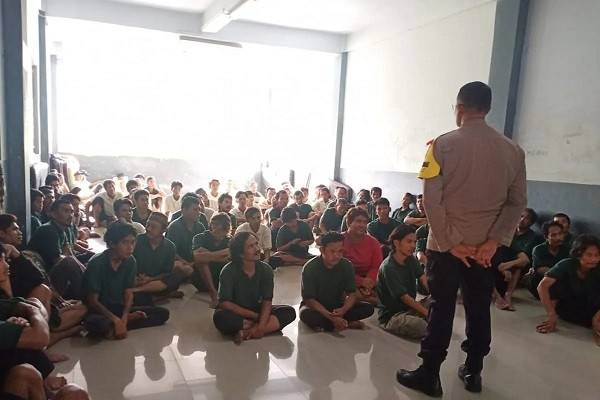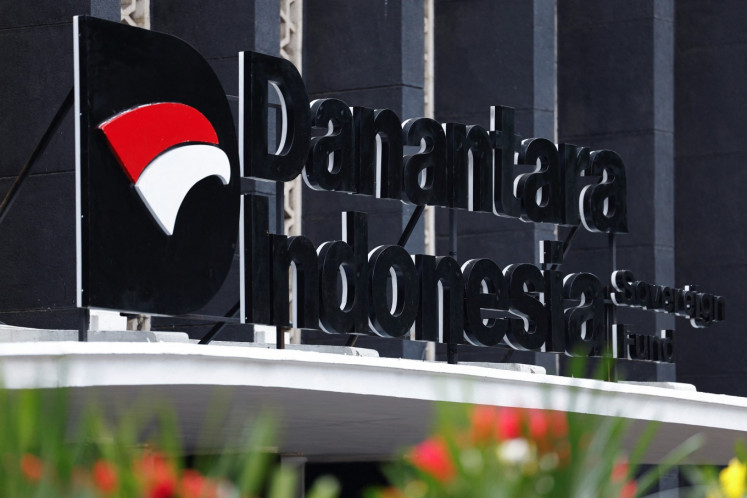Popular Reads
Top Results
Can't find what you're looking for?
View all search resultsPopular Reads
Top Results
Can't find what you're looking for?
View all search resultsDisincentives stall the oil, gas business
The government needs to make immediate changes across the board to ensure that the national industry can keep pace and compete with other countries.
Change text size
Gift Premium Articles
to Anyone
T
he old adage, every cloud has a silver lining, could well be true. The current slump in global oil prices, which has shaken even the upstream oil and gas business, is in fact a golden opportunity for the sector’s development in Indonesia, if we take advantage of it.
The crash of world oil prices, from a sustained US$100 plus per barrel to around $30 to 40 per barrel, has brought serious challenges for the national upstream oil and gas business.
Efficiencies are the only way to address these challenges.
The government needs to make immediate changes across the board to ensure that the national industry can keep pace and compete with other countries.
There is no point in talking about offering incentives. As the first step, eliminating disincentives should be the top priority.
This includes eliminating constricting regulations, such as tax policies. Although the oil and gas sector is still the largest contributor to non-tax state revenues, its contribution is not as large as it used to be.
But it should be remembered that excessive taxation will stifle the industry.
Investment will slow, yet substantial investor funding is needed to drive exploration.
But the discovery of new oil and gas fields has become scarcer and scarcer, especially in the eastern parts of Indonesia, where conditions are far more difficult.
One example of these onerous tax policies is the Value Added Tax ( PPN ) charged on the use of joint gas pipes, which oil and gas contractors ultimately charge to the government under the investment cost recovery scheme.
The cost recovery scheme is regulated through the tax restitution mechanism.
But the problem is that process of refunds takes months, even years, to complete, which affects the cash flow of contractors. This results in losses for the contractor.
At first glance, these losses seem insignificant, but visits to ports, fabrication companies and plants supporting the upstream oil and gas business in Batam some time ago revealed that all were operating at just 30 percent of capacity.
More than 100,000 workers had lost their jobs. All this was the result of the decline in upstream oil and gas activities.
This means that upsetting contractors in the upstream oil and gas sector has an adverse impact on supporting industries, which employ hundreds of thousands of workers.
Ultimately, this will have a negative impact on tax revenue as well.
Another type of disincentive was the Land and Buildings Tax ( PBB ), which contractors previously had to pay during the exploration phase.
Although this policy has been revoked, it continues to have an impact.
As a result of late filing, several cases before the Tax Court have not been decided. The total amount of tax involved is Rp 3.1 trillion ( $233 million ), or the equivalent of the cost of drilling two deep water wells.
Another common disincentive is the long and complicated licensing processes at national and local levels.
To eliminate these disincentives, there needs to be better understanding and coordination between state agencies, who must not get caught up in sectoral egotism.
Also, the proposed revision of the Oil and Gas Law No. 22/2001, which is included on the list of legislation to be deliberated in 2016, should be accelerated.
Having a new oil and gas law should provide a joint legal basis for the oil and gas industry, including to mitigate the frequent potential conflict between statutory provisions.
In other words, this law should be lex specialis ( overrides a law that only governs general matters ).
However, this new law minimizes loopholes for abuse. Detailed regulations are needed. For example, regulations on energy resilience in the Oil and Gas Law must be complemented by other articles about preventing damage to forests, as mandated by the Forestry Law. In this way, potential conflict is avoided.
It is crucial that the government and the House of Representatives undertake detailed and systematic mapping of such conflicting provisions. Otherwise, the newly revised Oil and Gas Law will do nothing more than repeat past mistakes.
The new Oil and Gas Law is also important to explain the existence of the Special Task Force for Upstream Oil and Gas Business Activities ( SKKMigas ), which still hangs in the balance. As the business partner of oil and gas contractors, SKKMigas could take the form of a special state enterprise ( BUMN Khusus ).
However, unlike state enterprises, which seek to maximize profits to be paid out in the form of dividends to the state treasury, the task of a BUMN Khusus is to secure the state the largest share possible of oil and gas revenues.
With these changes, this crisis could prove to be a blessing for the national upstream oil and gas business.
***
The writer is head of the Special Task Force for the Upstream Oil and Gas Business Activities ( SKKMigas ).
---------------
We are looking for information, opinions, and in-depth analysis from experts or scholars in a variety of fields. We choose articles based on facts or opinions about general news, as well as quality analysis and commentary about Indonesia or international events. Send your piece to community@jakpost.com.










